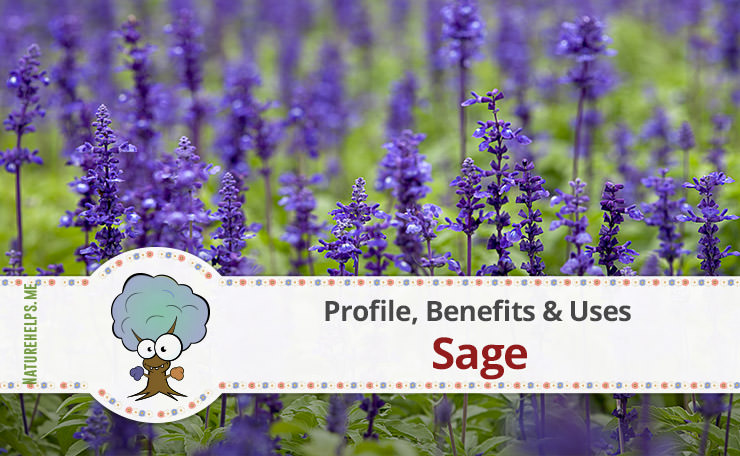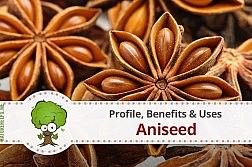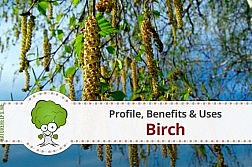Sage has been revered for centuries for its medicinal as well as culinary uses, since it was named for that quality. It has a considerable reputation as a remedy, given in small and often-repeated doses.
Sage (Salvia officinalis, Salviae folium) is native to the northern Mediterranean coast, where it’s used frequently in cooking. Sage’s long, narrow leaves have a distinctively fuzzy texture and musty flavor redolent of eucalyptus, cedar, lemon, and mint. Italians love it with veal, while the French add it to stuffings, cured meats, sausages, and pork dishes. Americans, of course, associate it with turkey and dressing.
History of Safe Benefits
The healing properties of sage have been known since ancient times. This wonderful plant is used as a folk and scientific medicine. The leaves and flowers have antimicrobial, anti-inflammatory, disinfectant, astringent, analgesic, expectorant, diuretic, hemostatic effect.
Sage has one of the longest histories of use of any culinary or medicinal herb. Ancient Egyptians used it as a fertility drug (Bown, 1995). In the first century C.E. Greek physician Dioscorides reported that the aqueous decoction of sage stopped bleeding of wounds and cleaned ulcers and sores. He also recommended sage juice in warm water for hoarseness and coughs. It was used by herbalists externally to treat sprains, swelling, ulcers, and bleeding. Internally, a tea made from sage leaves has had a long history of use to treat sore throats and coughs; often by gargling. It was also used by herbalists for rheumatism, excessive menstrual bleeding, and to dry up a mother’s milk when nursing was stopped. It was particularly noted for strengthening the nervous system, improving memory, and sharpening the senses.
Grass is able to increase the secretory activity of the digestive tract, increases the secretion of gastric juice, reduces lactation and excessive sweating. The plant is used to treat diseases of the liver, gallbladder, kidney, gastrointestinal tract (gastritis, ulcers, colitis, flatulence, diarrhea), inflammation of the upper respiratory tract, tuberculosis, stomatitis.
It is a good folk remedy to treat angina, bronchitis, mumps, gingivitis, sciatica, arthritis, neuritis. It is used for the treatment of skin problems, gynecological diseases, diabetes, wounds, boils, burns, ulcers, as asthma attacks reducer, and many other diseases.
Sage decoctions and tinctures are used to build up the central nervous system, and effective against streptococci, staphylococci and other Gram-positive bacterial flora. They are effective in treatment of festering sores, wounds and skin inflammation. Sage is also a source of natural antioxidants.
It is noticeable that sage is very popular in Korean medicine. Its leaves and roots have perfect anti-inflammatory and analgesic properties. It can reduce pain in the limbs, rheumatoid arthritis, habitual abortion, dysmenorrhea algic, menstrual disorders, inflammation of lymph nodes, mastitis and abrasions.
Modern medicine has proves that sage tea can help to get rid off frigidity, and can also significantly increase sex potency. Sage contains plant hormones, very similar to estrogen, thus, a plant used to treat infertility.
Sage Decoction and Its Benefits
It is easy to prepare sage decoction: take a spoonful of dried and chopped herb and pour with boiling water, infuse for 1 hour and then strain. Drink 100-150 ml 3 times a day.
Natural Antioxidant. Sage is also a natural source of flavonoids and polyphenolic compounds (e.g., carnosic acid, rosmarinic acid and caffeic acid) possessing strong antioxidant, radical-scavenging, and antibacterial activities. According to the article “Chemistry, Pharmacology, and Medicinal Property of Sage (Salvia) to Prevent and Cure Illnesses such as Obesity, Diabetes, Depression, Dementia, Lupus, Autism, Heart Disease, and Cancer” published in Journal of Traditional and Complimentary Medicine, 2014, the majority of the phenolic acids in sage are derivatives of caffeic acid which is the building block of a variety of plant metabolites.[15] Caffeic acid plays a central role in the biochemistry of the Lamiaceae plants, and occurs mainly in a dimer form as rosmarinic acid. Carnosic acid and rosmarinic acid, which are present at high concentrations in the extract of sage plants, have shown strong antioxidant properties.
To regulate the digestive system, relief of menopause, decrease sweating (tuberculosis, fever), take infusion: 1 tablespoon of dried sage pour with boiling water, infuse for 1 hour, after that strain. Drink half a cup 3 times daily after meals.
To stop the inflammation of the respiratory organs (throat, tonsils, bronchitis) inhalation will be very helpful. Put dried herb into an enamel pot and simmer for 5 minutes, then hide under a towel and breath in the herbal steam.
To prevent atherosclerosis, to stimulate the nervous system better apply sage tincture: 3 tablespoons of dried herb pour with 0, 5 liters of 40% alcohol, infuse for 1 month in a tightly sealed container. Eat 1 tbsp. spoon on an empty stomach with water.
Five tablespoons of dried sage pour with water, simmer for 10 minutes, infuse for 20 minutes, strain. This decoction is very useful for treatment of following diseases:
Stomatitis, gingivitis, fluxes, bleeding gums, sore throat – rinse the mouth with sage decoction.
Rheumatism, arthritis, ulcers, skin diseases, frostbite, bruises wounds – apply compress with sage decoction.
Stop Alopecia (hair loss)with Sage – sage decoction is an excellent tool for strengthening the hair follicles, which can significantly slow down the process of hair loss or even prevent it.
Eczema – take a bath with sage decoction.
Contraindications of Sage Decoction Application
Sage decoction and tinctures are not recommended to apply during pregnancy. Those who have inflamed kidneys, hypotension, or reduced thyroid function also should avoid usage of sage infusions.
Due to its astringent quality, too much sage tea can cause a dry mouth, and skin irritation can occur with topical use.
References:
Chemistry, Pharmacology, and Medicinal Property of Sage (Salvia) to Prevent and Cure Illnesses such as Obesity, Diabetes, Depression, Dementia, Lupus, Autism, Heart Disease, and Cancer (Journal of Traditional and Complimentary Medicine, 2014) – Link




